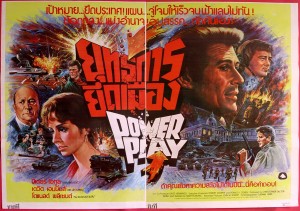 Martyn Burke’s “Power Play” is a low-budget thriller that looks as good as the more expense thrillers of the late seventies. All the elements for a solid action picture crackle with ingenuity as an intelligent script guides top-notch, powerhouse performances in this innovative experience. It also provides one of the best surprise endings in cinema history, which all makes sense when you watch the picture for a second time.
Martyn Burke’s “Power Play” is a low-budget thriller that looks as good as the more expense thrillers of the late seventies. All the elements for a solid action picture crackle with ingenuity as an intelligent script guides top-notch, powerhouse performances in this innovative experience. It also provides one of the best surprise endings in cinema history, which all makes sense when you watch the picture for a second time.
The premise centers around an unnamed country, which a conspiracy to commit a coup d’etat is boiling under the surface. The film sets a deliberate slow pace to allow some time to get to know our unique cast of characters. The main focal point is from Colonel Anthony Narriman, who is exquisitely played by David Hemmings. Narriman wants to be in charge of the country and is strategically planning the perfect way to do so. Throughout the entire narrative it is never certain whether or not his plan will work or if all his men can pull it together to carry through the plan.
His men deal heavily with alcoholism to combat the stress of the clandestine meetings but that is nothing when dealing with the sadistic officer, who is trying to figure out what is going on. He is marvelously played by Donald Pleasence, who creates a character in Blair that is evil and intriguing at the same time. Blair is a man who believes in his cause and that the good of country is more important than the lives of a few. He is delusional in his quest to be a hero but he never backs down in his attempts to try to crack this perplexing mystery.
Pleasence and Hemmings are such great actors that it elevates what could be a boring movie into something extraordinary, but there is one more legendary actor in the cast. Peter O’Toole plays Colonel Zeller, whose tanks they desperately need to carry out the coup d’etat. In what could have been a marginal performance by a lesser actor is turned into something more by O’Toole. Never for one moment can the audience know what Zeller’s motives are for partaking in this risky endeavor but we know he is a more intelligent character than everyone else. This clue about the character of Zeller is displayed not with words but through O’Toole’s eyes and use of body language. In fact once he gets more screen time in the picture the pace picks up.
A melodramatic sub-plot involves Zeller and his secret lover and it seems added in to keep the attention of the audience with Soap-Opera tactics and wasn’t essentially needed to tell the story. That said it is nevertheless entertaining.
Burke’s direction exhibits the enthusiasm of a young director, who was lucky enough to work with an amazing cast. The picture was a term of endearment for him since he also co-wrote the script and worked hard to ensure that this production would happen. Overall he creates a movie with no simple answers that allows the viewer to use their brain.
The movie can’t escape the dated look and faded cinematography of the late seventies and maybe that is a minor flaw to this otherwise great piece of low-budget cinema. Your attention is often diverted from that by the gripping story that pulls you in.
The film also suffered from a poor marketing, which included a trailer that made it look like a non-stop barrage of fast paced action sequences. In the eighties it received nominal treatment from Media Home Entertainment on VHS and it wasn’t until 2007 that Code Red announced it has a forthcoming title on several of their DVDs. However, after many issues with Code Red the rights were given over to Scorpion Releasing, which did a fantastic job of releasing it on February 23. It is great that this film may have a second life on DVD.
“Power Play” reaffirms why Pleasence, Hemmings and O’Toole are amazing actors, while making us wonder why Burke isn’t more widely known. It is smart, low-budget cinema that sticks with you long after the closing credits.

Leave a Reply